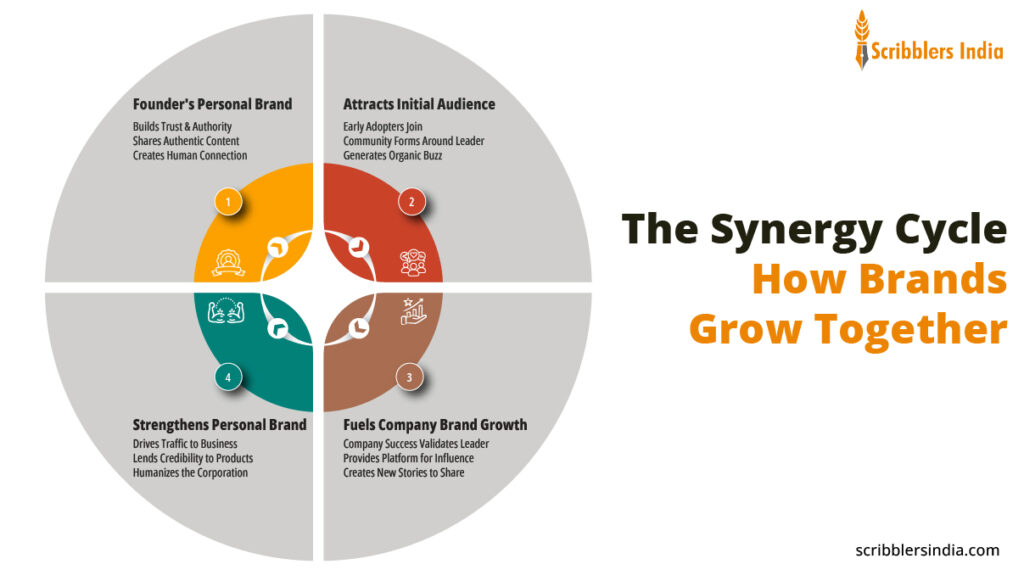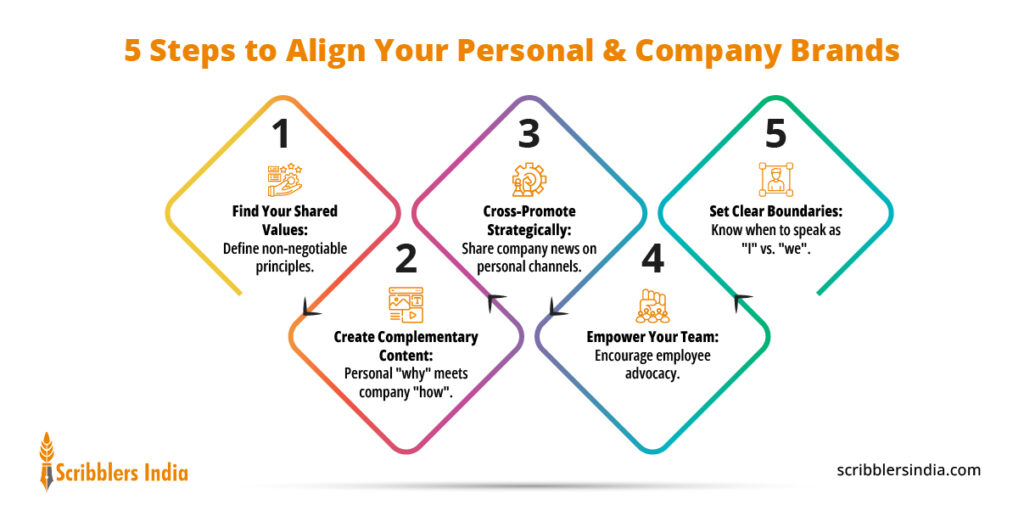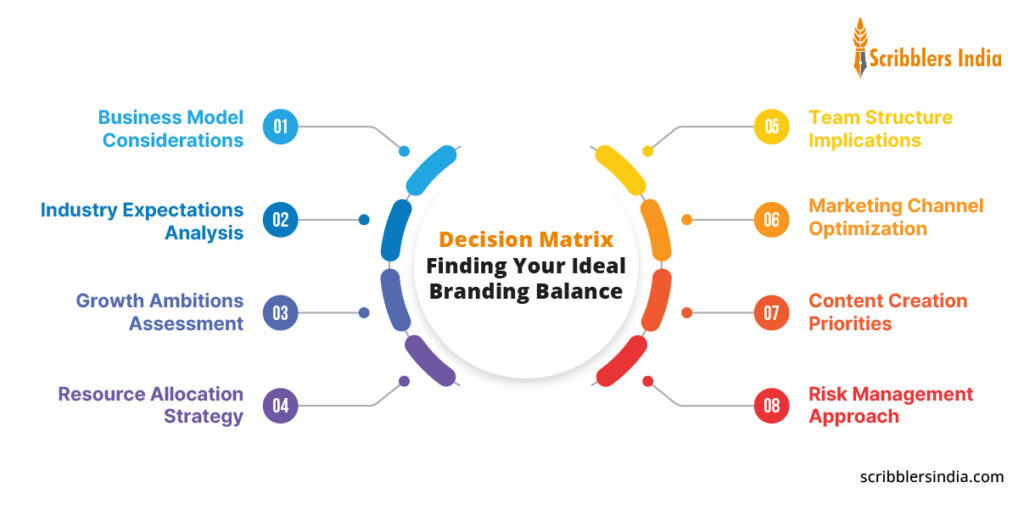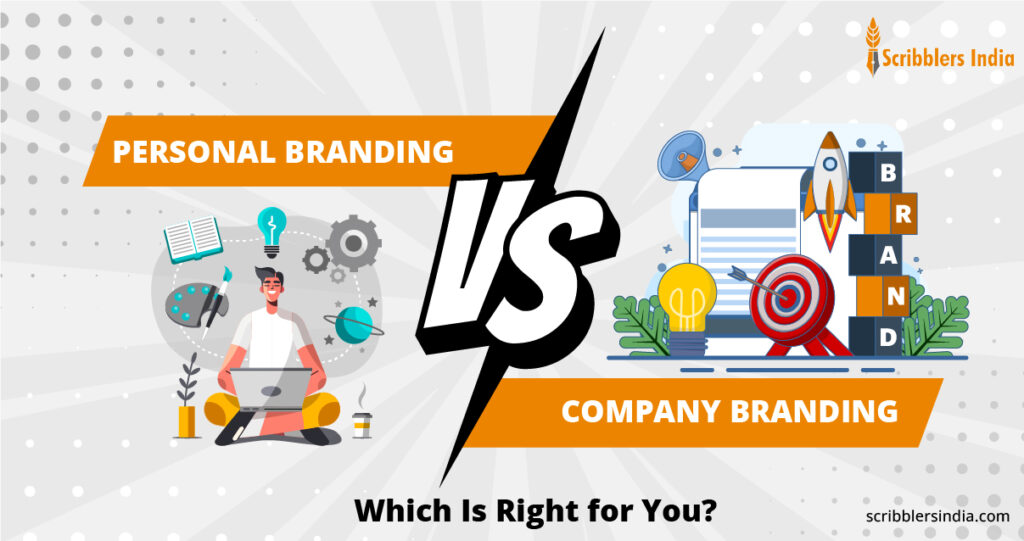Is Elon Musk’s brand Tesla’s brand, or is it his own? When you think of Virgin, do you picture the logo or Richard Branson’s adventurous smile? This brings up a common point of confusion in our digital-first world. Many people mix up personal branding and company branding, yet they are two distinct and powerful tools in your strategic arsenal.
A personal brand is the unique story and reputation of an individual. A company brand represents the collective identity of an organization. Understanding the difference between a personal and corporate brand is crucial for success.
This blog will demystify the personal branding vs company branding debate. We will explore the unique power of each, their symbiotic relationship, and how you can strategically use both. This is especially vital for entrepreneurs, freelancers, and experts who are often both the face of their work and the business itself.
What is the Real Difference Between Personal Branding vs Company Branding?
The fundamental difference amongst personal branding vs company branding is focus. A personal brand centers on an individual’s unique identity, skills, and values. In contrast, a company brand is built around the organization’s collective mission, its products or services, and its overall corporate identity, designed to exist beyond any one person.
Defining Personal Branding
Your personal brand is the intentional cultivation of your public reputation. It is how the world perceives your unique combination of skills, experiences, and personality. Your personal brand is your story, expertise, and values rolled into one authentic package.
- Individual Focus: It is fundamentally about you as a distinct professional entity. Your name is the brand name.
- Showcases Expertise: It highlights your specific knowledge and authority within a niche.
- Builds Relationships: It leverages your personality to build direct connections and a loyal following.
- Prime Examples: This is the realm of thought leaders, coaches, artists, and specialized freelancers.
Defining Company Branding
A company brand, or corporate brand, is the identity of a business. It encompasses the organization’s mission, vision, and core values. It is communicated through its name, logo, customer service, and the entire customer experience.
- Organizational Focus: It represents the collective, not a single person’s identity.
- Promotes Offerings: It is built around the products or services the business provides to the market.
- Creates Consistency: It ensures a uniform and predictable experience for all customers and stakeholders.
- Prime Examples: Think of large corporations like Apple, startups like Notion, or any e-commerce business.
Key Distinctions at a Glance: Comparing Personal Branding vs Company Branding
|
Distinction |
Personal Brand |
Company Brand |
|
Primary Focus |
Individual identity, expertise, and relationships |
Organizational identity, products/services, and market positioning |
|
Target Audience |
Professional network, followers, and direct clients |
Customers, investors, partners, and the broader market |
|
Communication Style |
Often more authentic, conversational, and personality-driven |
Typically more consistent, professional, and strategically crafted |
|
Flexibility |
Can pivot quickly based on individual growth and interests |
Changes require more strategic planning and stakeholder buy-in |
|
Longevity |
Usually tied to your career lifespan or personal presence |
Designed for long-term scalability and potential transition of ownership |
Why Do People Trust Personal Brands More Than Company Brands?
People fundamentally trust other people more than they trust faceless corporations. A personal brand cuts through the noise of corporate advertising by creating a genuine, human-to-human connection that feels more authentic and relatable, fostering a deeper level of trust and loyalty.
This preference for the personal touch is backed by data. A recent report highlights that 88% of consumers trust recommendations from individuals over branded content, even if they do not know them personally. This statistic reveals a powerful truth about modern consumer psychology.
- Authenticity and Relatability: Personal brands can share real stories, including struggles and successes. This vulnerability makes them more relatable than a polished corporate message.
- Direct Engagement: It is easier to have a one-on-one conversation with an individual on social media than it is with a large company, building real relationships.
- Overcoming Skepticism: In an era saturated with ads, consumers are skeptical. A recommendation from a trusted individual carries more weight than a corporate promise.
- The Human Connection: We are wired to connect with faces, voices, and stories. A strong personal brand provides a human anchor in a digital world.
What are the Main Benefits of Having a Strong Personal Brand?
A strong personal brand creates immense opportunities for both individuals and the businesses they lead. Individuals can establish authority and attract better career prospects. Businesses can humanize their company by building a bridge of trust and loyalty with customers through personal connections.
For Individuals: Building Your Professional Equity
Developing your personal brand is an investment in your own professional future. It separates you from the competition and makes you a magnet for new opportunities.
- Boosts Visibility: A clear brand makes you more recognizable and memorable in your field.
- Establishes Authority: You become the go-to expert, building credibility and trust.
- Attracts Opportunities: This leads to speaking gigs, media features, and collaborations.
- Enhances Networking: Your brand acts as a conversation starter, drawing like-minded professionals to you.
For Businesses: The Human-Centered Advantage
The benefits of a personal brand for businesses are significant, especially in a market where consumers crave authenticity. The founder’s or CEO’s personal brand can become a powerful asset.
- Humanizes the Company: It provides a relatable face and a human story behind the logo.
- Builds Customer Loyalty: Customers who trust you are more likely to be loyal to your company.
- Acts as a Marketing Channel: A leader’s influential social media presence can drive significant sales.
- Attracts Top Talent: People want to work for leaders they admire and respect.

Is a Company Brand Still Important if I Have a Strong Personal Brand?
Absolutely, when you compare personal branding vs company branding, it becomes clear that a company brand is essential for long-term growth, scalability, and creating an entity that can thrive independently of you.
While your personal brand can provide the initial spark, a company brand builds the sustainable fire that can outlast any single individual’s involvement.
Relying solely on an individual branding vs business branding approach has its limits. A strong company brand provides the structure and identity needed for true scalability and lasting market presence.
- Scalability and Longevity: A company brand can grow with a team and exist long after the founder steps away. It is an asset you can one day sell.
- Team Culture: It provides a unifying mission and identity for all employees, fostering a cohesive company culture that is greater than the sum of its parts.
- Legal & Financial Structure: A formal business entity is crucial for attracting investment, entering into contracts, and securing legal protection.
- Wider Market Reach: It can appeal to a broader audience that may not be part of your personal brand’s immediate network.
- Risk Mitigation: If your personal brand faces controversy, a distinct company brand can help weather the storm and protect the organization.
How Does a Personal Brand Help a Company Brand Grow?
A personal brand acts as a powerful amplifier for a company brand. When a founder or leader shares their insights and vision, they generate authentic interest and credibility that flows directly to their business, creating a powerful synergy between personal and company branding.
This relationship is not about one overshadowing the other; it is about strategic alignment. When done correctly, the personal brand becomes the company’s most effective brand ambassador.
- Thought Leadership Amplification: Your expert articles and posts drive traffic and awareness to your company’s website and offerings.
- Internal Influencer Marketing: The founder and key employees become natural, trusted advocates for the brand.
- Authentic Content Engine: Your personal experiences and stories provide an endless source of relatable content that resonates more than corporate-speak.
- Powerful Networking: Your personal connections can open doors to valuable business partnerships and opportunities.
- Crisis Management: A trusted leader can address challenges openly, lending their personal credibility to the company during difficult times.
What Happens When Personal and Company Brands Don’t Match Up?
When a leader’s personal brand clashes with their company’s brand, it creates confusion and erodes trust. This misalignment sends conflicting messages to your audience, employees, and stakeholders, ultimately undermining the credibility of both brands and creating significant reputational risk.
Consistency is the cornerstone of effective branding. A disconnect between what you say personally and what your company does professionally can have severe consequences.
- Conflicting Messages: If your personal brand values innovation but your company is slow to adapt, your audience will notice the hypocrisy.
- Reputational Damage: Negative personal behavior that contradicts the company’s stated values can directly harm the business’s reputation.
- Challenges with Scale: If the company is too dependent on the founder’s persona, it becomes difficult to grow beyond that individual’s capacity.
- Employee Disengagement: A culture can feel inauthentic if the leadership’s public-facing brand does not reflect the internal reality.

How Can You Make Your Personal and Company Brands Work Together?
The key is alignment. To create a powerful synergy, ensure that your personal brand’s values align with your company’s brand mission. They should not be identical, but they must be complementary, telling a consistent and compelling story across all platforms.
This strategic alignment shows how a personal brand supports a company brand. It is about creating a unified front where each brand reinforces the other.
Define Your Core Values
Ensure the values you champion personally are the same values embedded in your company’s culture and mission. This alignment is the foundation of authenticity.
Maintain Thematic Consistency
Your personal and company content do not need to be the same, but they should share common themes. If your company helps businesses scale, your personal content could share leadership lessons on growth.
Practice Strategic Content Sharing
Use your personal platforms to share and add context to your company’s achievements and content. Likewise, have your company highlight the expertise and thought leadership of its key people.
Empower Your Team
Encourage employees to build their own professional brands in a way that aligns with the company’s values. This creates an army of authentic brand ambassadors.

Should I Focus on My Personal Brand, Company Brand, or Both?
The right focus depends entirely on your long-term goals. For most entrepreneurs and knowledge experts, the most powerful approach is not choosing one over the other in the personal branding vs company branding debate, but building both in a strategic, symbiotic relationship.
Your decision should be guided by your vision for the future, your industry, and what your audience expects from you.
- Consider Your Goals: Are you a consultant selling your expertise? A personal brand might be primary. Are you building a software product? A company brand is crucial for scalability.
- Look at Your Industry: Creative fields often favor strong personal brands. Sectors like finance or large-scale manufacturing often require a more formal corporate presence.
- Envision the Future: Do you plan to sell your business one day? If so, you need a company brand that can stand on its own.
- The Hybrid Model: When you ask people to choose between personal branding vs company branding, for many the answer is both. Use your personal brand to build initial trust and authority, which then fuels the growth and credibility of your company brand.
Why Choose Scribblers India for Personal Branding Services?
At Scribblers India, we specialize in crafting authentic personal brands that complement your business objectives. Our strategic approach ensures that your personal brand becomes a powerful asset, driving sustainable business growth.
- Expert Brand Storytelling: We transform your expertise and experiences into compelling narratives that resonate with your target audience, establishing credibility while maintaining your authentic voice.
- Strategic Consistency: Our team ensures perfect alignment between your personal and company branding, creating a seamless experience that builds trust across all touchpoints and platforms.
- Visibility Amplification: We implement targeted personal branding strategies to increase your visibility in your industry, connecting you with the right audiences through optimized content and strategic positioning.
- Measurable Results: Our data-driven approach tracks key metrics that matter, ensuring your personal branding efforts deliver tangible business outcomes and genuine ROI.
Ready to elevate your personal brand and business simultaneously? Contact our experts today for personal branding services that will set you apart from the competition and drive meaningful growth.
Why Personal and Company Branding Matter for Your Success?
In today’s crowded marketplace, the debate over personal branding vs company branding is not about picking a winner. It is about understanding that both are distinct, powerful tools. A personal brand builds connection and trust through authenticity.
A company brand builds a scalable, lasting asset. True competitive advantage lies in mastering the synergy between personal and company branding.
For the entrepreneurs, thought leaders, and innovators in our Scribblers India community, this is not just a marketing concept; it is a strategic imperative. Your personal brand can open doors, and your company brand can build the entire house.
Take a moment to reflect. How are you managing these two critical assets? Are they working in harmony to tell a consistent, powerful story? At Scribblers India, we believe that crafting a clear and compelling brand story is the first step toward building a lasting legacy. Intentional, strategic branding is no longer optional—it is the key to your success.
Frequently Asked Questions
What is the main difference between personal branding vs company branding?
A personal brand is built around an individual’s reputation, skills, and personality. A business or company brand is the collective identity of an organization, encompassing its mission, values, and products, designed to exist independently of any individual.
Can you have a personal brand and a company brand?
Yes, and it is often the most powerful strategy. You can use your personal brand to build trust and authority, which in turn lends credibility and a human connection to your company brand, creating a strong synergistic relationship.
When should you use a personal brand over a business brand?
Focus on a personal brand if you are a freelancer, coach, author, or speaker whose expertise is the primary product. This approach helps build trust and community quickly, as people connect with and buy from other people they know and respect.
Does a CEO’s personal brand affect the company?
Absolutely. A CEO’s strong, positive personal brand can humanize the company, attract talent, and build customer loyalty. Conversely, a negative or misaligned personal brand can create reputational risk and harm the company’s image and trustworthiness.
How do you transition from a personal brand to a company brand?
Start by creating a distinct identity for your company with its own name, mission, and values. Gradually shift the focus from you as the individual to the company as the solution provider, empowering team members to become brand faces as well. You can avail personal branding services from experts to help with this task.






